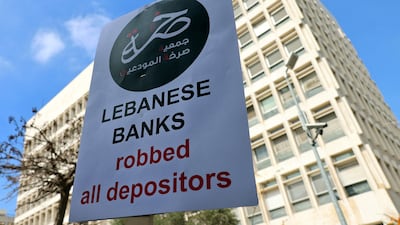Not a week goes by without Lebanese depositors storming their own banks in a desperate attempt to access savings frozen after the country's economy collapsed.
Banks began imposing draconian limits on withdrawals and transfers in 2019, leaving depositors able to access only a fraction of their savings in dollars and Lebanese pounds.
But since the start of the crisis, Lebanese leaders have done little to implement reforms and torpedoed successive recovery plans aimed at fairly allocating financial losses between the state, the financial sector and depositors.
Some depositors have turned to local courts to contest the restrictions, but without success.
Locked out of their life savings, ordinary depositors have grown increasingly exasperated, while the ruling elite was able to move funds in the early days of a crushing crisis that drove most of the population into poverty.
Former director-general of the Ministry of Finance Alain Bifani estimated that $6 billion was “smuggled” by bankers outside Lebanon for the political and economic elites while they were blocking transfers abroad for ordinary people.
“These forced withdrawals — we do not call them heists, because this would imply that these depositors are stealing other people's money — are a solution of last-resort after the exhaustion of all possible ways for depositors to recover their money,” said lawyer Fouad Debs, co-founder of Lebanese Depositors Union.
Bank heists in numbers and locations
The National has recorded 27 depositor bank “heists” since the start of the year, including armed and unarmed hold-ups and sit-ins.
These operations have allowed depositors to retrieve by force a total of nearly $450,000 — handed back in dollars and Lebanese pounds.
As impressive as they are, these withdrawals are tiny when compared to the $6 billion allegedly transferred for the political and economic elites.
More than $100 billion in savings remains trapped in Lebanese banks.
Most of the depositors who justified their actions mentioned humanitarian reasons: more than 70 per cent said they needed the money for a medical emergency and more than 20 per cent said it was to pay student fees.
While these incidents have been reported all over the country, most of them happened in Mount Lebanon (11) and Beirut (7).
Timeline
The first case of a depositor bank heist was recorded on January 18 when Abdallah Assaii, 37, a coffee shop owner, managed to retrieve $50,000 from a branch of BBAC in the town of Jeb Jannine in the Bekaa Valley after holding seven employees hostage.
It took two months to turn an isolated event into a national trend. On August 11, Bassam Al Sheikh Hussein was lauded as a hero after he held up his bank in Beirut for hours armed with a rifle and a gas canister, managing to withdraw $35,000. He was detained but freed after the bank dropped the charges.
Cases snowballed after Sali Hafez, 28 made international headlines for holding up her bank in Beirut with a toy gun in September to pay for her sister's cancer treatment.
The Depositors Outcry Association, one of the advocacy groups defending depositors’ rights, and United for Lebanon, a collective of Lebanese lawyers, said they helped orchestrate the heist and were ready to assist others.
This was the first time an association of depositors publicly claimed to have pre-planned a heist.
Ms Hafez inspired a slew of frustrated depositors to follow in her footsteps with five depositors holding up their own banks across Lebanon in the following days, including a former lieutenant.
This prompted banks to shut their doors in September citing security concerns, opening only on appointment.
But this has not stopped depositors from taking action, with 18 operations recorded since the partial closure, some with the help of lawyers and associations.
Independent Lebanese MP Cynthia Zarazir, who withdrew $8,500 after storming her bank unarmed, and depositors Ali Sahili and Ibrahim Baydoun, who took more than $50,000 from their accounts, were among the most publicised cases.
“People are claiming their rights, and if it were not for the political and financial elite which have blocked all reforms, they would not be in this position today,” Mr Debs said.
“But we need to advocate for a collective and fair solution for most depositors and the economy as a whole, or the situation is going to keep getting worse.”


